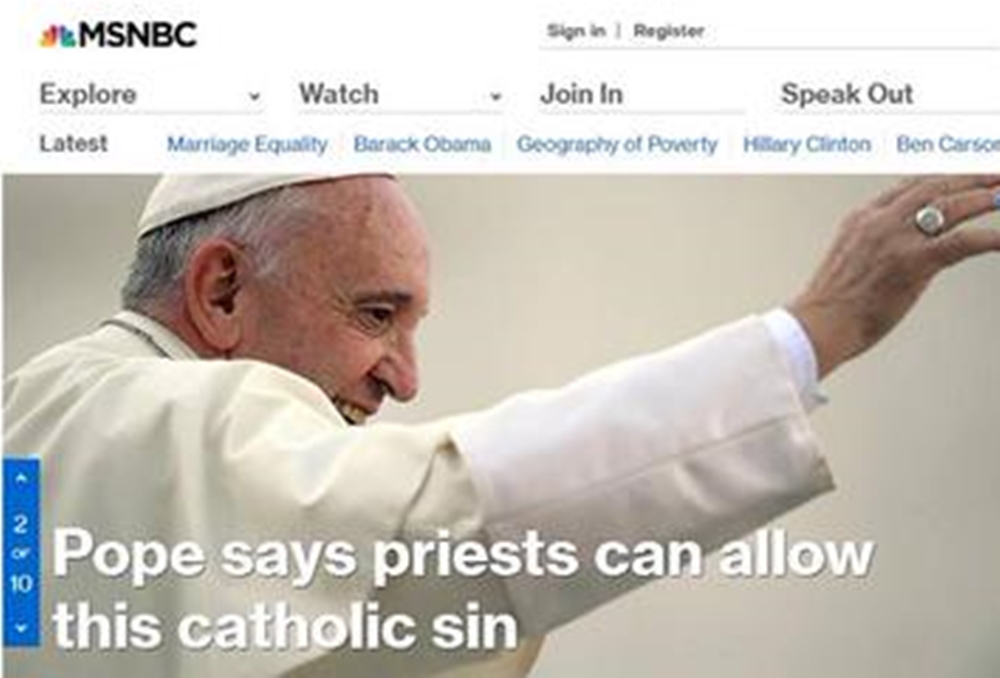Pope Francis’ special note this week on the Catholic Church’s outreach efforts to those who have been “scarred” by abortion has produced what may be the most inaccurate headline of 2015, courtesy of MSNBC.
In a letter to Archbishop Rino Fisichella, Francis said it is his hope for the upcoming Holy Year of Mercy, a jubilee year for the Roman Catholic Church running from Dec. 8, 2015, to Nov. 20, 2016, that those who have either procured or participated in an abortion will hear and respond to Christ’s message of forgiveness.
To that end, the letter added, Catholic priests will be granted for the entirety of the jubilee year a special privilege normally reserved for bishops. Priests will be allowed to receive back into the Church persons who have either obtained or facilitated an abortion, and the process of welcoming them back will be streamlined.
Francis’ letter does not signal a softening of the Catholic Church’s stance on abortion, nor does it mark a change in its longstanding doctrine on the sanctity of life.
But for anyone visiting MSNBC.com Tuesday afternoon, Francis had apparently done just that.
“Pope says priests can allow this catholic sin,” read an MSNBC headline that not only misreported Francis’ actual remarks, but also failed to recognize that the word “Catholic” is a proper noun.

The story not only suggests incorrectly that Francis is now “allowing” Catholics to get abortions, but it also ignores the historical context and factual significance of his letter to Archbishop Fisichella.
Francis’ letter said, “The forgiveness of God cannot be denied to one who has repented, especially when that person approaches the Sacrament of Confession with a sincere heart in order to obtain reconciliation with the Father.”
“For this reason too, I have decided, notwithstanding anything to the contrary, to concede to all priests for the Jubilee Year the discretion to absolve of the sin of abortion those who have procured it and who, with contrite heart, seek forgiveness for it. May priests fulfill this great task by expressing words of genuine welcome combined with a reflection that explains the gravity of the sin committed, besides indicating a path of authentic conversion by which to obtain the true and generous forgiveness of the Father who renews all with his presence,” the letter added.
In short, Francis is granting Catholic priests for the entirety of the Holy Year of Mercy the authority to engage more fully and efficiently with those who have been “scarred” by abortion.
Though the language used in his letter may appear confusing, the announcement is simple enough.
“Pope Francis has announced that all priests may fully absolve the sin of abortion as part of the Year of Mercy,” Michael Bayer of the University of Iowa’s Catholic Student Center explained Tuesday.
“Priests have long been empowered to forgive the sin, but abortion is one of the few examples in the modern church of what is known as excommunication latae setentae [automatic excommunication], that is, any person who knowingly participates in or procures an abortion is … automatically excommunicated,” he added.
MSNBC.com stands alone in its spectacular botching of the facts.
Other news outlets, including the Wall Street Journal and the Washington Post, had no problem conveying Francis’ note accurately.
“Pope to Make It Easier for Church to Forgive Women for Having Abortions,” read the Journal’s headline.
The Post declared in a report of its own, “Pope Francis emphasizes forgiveness for women who have abortions.”
It is forbidden in the Catholic Church to procure or participate in an abortion. To do so is punishable by automatic excommunication.
The Catechism of the Catholic Church teaches that, “From the first moment of his existence, a human being must be recognized as having the rights of a person.”
“Since the first century the Church has affirmed the moral evil of every procured abortion. This teaching has not changed and remains unchangeable. Direct abortion, that is to say, abortion willed either as an end or a means, is gravely contrary to the moral law,” it adds.
Though the Church maintains that abortion is a sin deserving of automatic excommunication, it does not hold that it is an unforgivable one (as the Church believes God is all forgiving, it also teaches that there is no sin too great to be forgiven).
“The Church does not thereby intend to restrict the scope of mercy,” the Church’s catechism teaches. “Rather, she makes clear the gravity of the crime committed, the irreparable harm done to the innocent who is put to death, as well as to the parents and the whole of society.”
Excommunicated persons are considered by the Catholic Church to no longer be in good standing with the flock, meaning they are no longer able to partake in the sacraments. This includes the Sacrament of Reconciliation (more commonly known as “Confession”).
Ordinarily, for an excommunicated person to be welcomed back into the Catholic Church to take part in this sacrament, a bishop must first declare that they are in good standing. Bishops are the only ones with the authority to remove this label.
But Francis is now formally extending that authority to even priests, enabling them to receive back into the Church excommunicated persons seeking participation in the sacraments, including Confession.
“[W]hat’s new about today’s announcement is that any priest globally is now empowered to grant absolution [which can be gained through confession], and, presumably, to lift the excommunication,” Bayer wrote.
Originating in Judaism, a jubilee year in the Catholic Church is “linked to universal pardons and reconciliation” and is normally “celebrated every fifty years,” explained the national Catholic weekly magazine America.
Traditionally, a jubilee year was one in which “slaves and prisoners were freed, debts were forgiven and God’s mercy was made more manifest,” the America article added.
